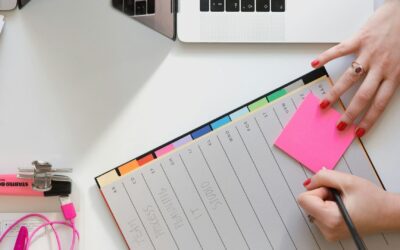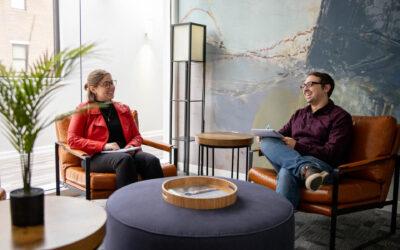Small businesses with big impact
Dan Broersma, Sustainability Manager at the City of Holland, joins Vince for this week’s Klatsch to discuss ESG (Environment, Social, Governance) practices from large scale businesses and how they can be modeled at a smaller scale.
Top Takeaways
- The most important first step in rolling out ESG in a small business is to measure consumption of all kinds.
- As Dan says: “All roads lead to carbon.” Sustainability in other areas will always offset carbon emissions somewhere down the line.
- ESG policies should be flexible and applicable to your workflow.
Transcript:
Vince Boileau: Hey friends! Welcome back to the Coffee Klatsch — our video series where we bring on people who we think are interesting to talk about insights, practices and new ways of thinking that you can put to work in your organization. Today, I’m joined by Dan Broersma, who’s the Sustainability Manager at the City of Holland. Welcome to the show.
Dan Broersma: Thank you.
VB: So today the topic is ESG for small business. What are some things that companies that are maybe under 50 employees can be doing to start to roll out ESG-style practices in their own businesses?
DB: I would say measure, measure, and then measure again. Measure your electricity, measure your gas, measure your waste that’s going out. It’s not just on the back end or how much energy — it’s also what you’re buying on the front end. And take a look at, “Okay so we had a company picnic. Well, how many paper plates did we buy to throw away?” So if we start to take a look at it from that perspective, you can dig in and actually start to change those practices from even from just a financial perspective. Going back to those plates, well it would be cheaper for us to bring them back and put them into the dishwasher. If you’re looking at your bills and things along [those] lines, you really need to figure out, “Okay I know what I did for gas this year but how did it comparison to last year or the year before?” Or just ask the question, are you on the right rate? Are you — you know, because there are different rates for different businesses. If you read the bills and you take a look at the other things that are in there, you might be able to — “Oh look I can get 36 free LED light bulbs.” All of the sudden your bill goes from here to here, and you’re actually saving energy at the same time.
VB: If I think about this through the lens of, maybe, a Triple Bottom Line company, right, I have a financial P&L, right? But what does my carbon or sustainability P&L look like? It used to be that the big companies would simply push that responsibility down the supply chain and let somebody else be bad for the environment, but now it’s — we’re realizing that the accountability is going a little bit deeper than that.
DB: You mentioned carbon and — don’t get me wrong, it’s extremely important — but one of the things that I like to tell folks or at least, you know, counsel them on is, all roads lead to carbon. Or a lot of organizations think, “Oh, you know, carbon — I have to reduce all my energy or I have to put up solar panels.” Well, no let’s just start, you know, doing all the things that are already available to us. Then you can start to measure the carbon.
VB: What are some things that small businesses could do at a procurement policy level to protect and ensure that we’re making good decisions at the start so that we’re not stuck
in a situation where, “Man, I have something that’s not recyclable and I need to get rid of it, and I feel bad, and I’m stuck now because we have an ESG policy that says I can’t get rid of this thing, and so it’s just gonna go sit in a warehouse somewhere?
DB: So I worked with a small company a while back but basically what they said is, “We want to cut down on the amount of waste that we’re throwing away.” We found out how much we were throwing away and then we decided to say, “Why do we have that?” There was a certain material that [was] coming in from China, and they would open it up and it would be filled with these little packages of dry.
VB: A little silica packet?
DB: Yeah, and they would be full of them. I counseled them and I said, “So why do we have all these packs? There’s no way to recycle them locally.” They decided to go back and ask their supplier, “Why are you sending these? Is there something else that’s recyclable or returnable that we can do?” And because they asked the question, the supplier actually started bringing a blanket and then they would be able to ship it back with the returnable packaging at the same time. So it cut down on the silica packages, but it also cut down on the package itself because the company said, “Well, if we’re going to take these back, let’s take the packaging back.”
VB: So I think what I’m hearing, then, at the highest level, start measuring, and start asking questions, and you might find that things start to click into place.
DB: And if there’s another leader that’s in this field, go have a conversation.
VB: Sustainability knowledge is “open-source” in that way. This is the one kind of “IP” that people are glad to help you steal because it’s going to make the world a better place.
DB: Right.
VB: Thanks for joining me today and tackling this topic together.
DB: Excellent, thank you for having me.


